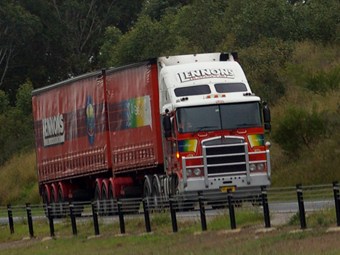Record 1.3 Million Fine for Lennons Transport
Lennon’s Compliance management weaknesses and lack of Chain of Responsibility Compliance system was a major lead to penalty topping that of the recent 1.25 Million Scott’s Transport Fine.
“I find that these offences are close to the most serious case (on a scale of serious, very serious, most serious),” Stapleton states in her ruling document.
The compliance shortfall cost the company and Lennon a combined $1.3 million, which exceeds previous record penalty of $1.25 million against Scott’s Transport in June 2014.
The magistrate who ruled on the nation’s biggest fine for a trucking company so far highlights several speeding compliance management weaknesses in her judgement on 197 Lennons Transport speeding offences.
Downing Centre Local Court magistrate Lisa Stapleton found that Zaens Pty Ltd, operating as Lennons Transport, and director Tony Lennon did not have proper anti-speeding policies and procedures or take reasonable steps to prevent drivers speeding.
While accepting Lennon had suffered ill-health at the time, Stapleton rejects the argument that the company had a proper compliance system in place, noting that drivers themselves were responsible for reporting infringements “which might result in instant dismissal” and that explicit responsibility on managers to ensure compliance was missing.
“There is no evidence that Zaens’ management were required to, for example, check average speeds by reference to data from the GPS system, by reference to information from the drivers’ fatigue logs or by reference to pick up and delivery times recorded on consignment notes or the like,” she states.
There was no evidence that “Zaens imposed a standard time for a particular route” nor that the company required drivers “to produce a licence record to check for speeding offences” for company work.
RMS sent notices in 2010 and 2011 that company trucks had exceeded the speed limit by 15 km/h or more, including twice in December 2011 at 117 km/h and 120 km/h, but there was “no evidence to explain its system of ensuring speed limiter compliance in December 2011.
RMS sent notices in 2010 and 2011 that company trucks had exceeded the speed limit by 15 km/h or more, including twice in December 2011 at 117 km/h and 120 km/h, but there was “no evidence to explain its system of ensuring speed limiter compliance in December 2011”.
The court accepted that since 2012 measures had been introduced including:
- changes to the drivers’ manual emphasising speed limit compliance
- transporting freight that is less time critical
- nominating a manager responsible for inspecting all fatigue sheets and log books and communicating with clients about delivery times
- fitting a speed compliance warning in all truck cabins
- appointing Lennon’s wife to run the office, allowing Lennon more time to focus on safety management
- identifying (with intention to install) a satellite tracking system in each truck. The system will permit tracking of time and speed
- monthly truck servicing that included checking speed sensors, speed pulse wheels and speed limiter compliance
- regular training of management in speed compliance issues
- regular meetings with drivers about speed
- an improved induction process relating to speed
- increased background checks on employees.
However, despite an industry consultant appointed in June finding the company was a compliant business, RMS tendered records showing 30 mass or dimension offences along with the speeding offences committed by company vehicles since July 2012.
While that might show the new system has issues, the magistrate accepted that it was a system and there “is a small likelihood of reoffending”.
Due to the company’s lack of action on RMS warning notices, Stapleton was not convinced entirely on evidence of remorse other than the guilty plea. This, along with Lennon being of good character and the agreement to pay $100,000 in RMS legal costs, was enough to attract an 18 per cent penalty discount.
In the New South Wales Government’s response to the fine, roads and freight minister Duncan Gay and RMS compliance operations general manager of Paul Endycott say that the “biggest penalty in NSW history against a trucking company under chain of responsibility legislation” came after a triple fatality involving a Lennon’s truck on the Hume Highway at Menangle in January 2012.
“This is a terrible tragedy, there are no winners here, but I hope this decision by the court … brings some small comfort to the Logan family after their tragic loss,” Gay says.
“This fine of more than $1.3 million is the result of more than 18 months of investigation of the company by Roads and Maritime Services, which is separate to the NSW Police investigation into the crash.”
More at : http://www.fullyloaded.com.au/news/industry/1408/magistrate-notes-flaws-that-led-to-record-lennon’s-fine/?utm_source=atn_newsletter&utm_medium=email&utm_content=article1_image&utm_campaign=04-08-2014



